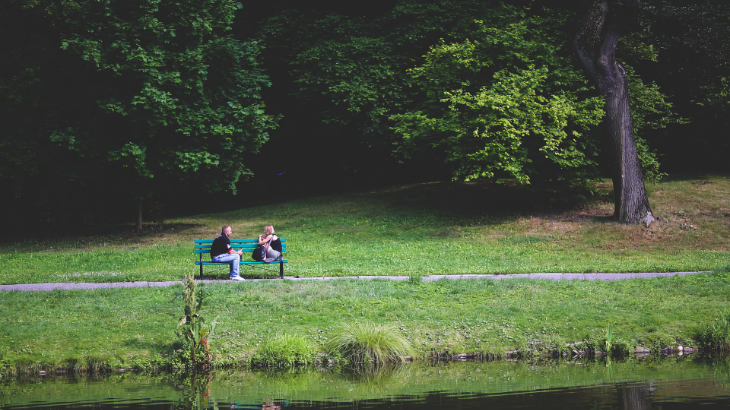We need to talk about climate - popcawn September 2024

Do you feel that people generally don’t talk about climate change? Considering how it will, and already does, affect all our lives, it doesn’t get the airtime it deserves.
Why could that be? I think there’s several reasons – it’s big and scary, it’s going to require lifestyle changes, and it’s increasingly politicised. So, it’s no surprise that it rarely makes the shortlist of conversation topics!
While others aren’t talking about it, and so don’t seem to be concerned or taking any action, it’s quite easy to put the threat of climate change right to the back of our minds. Worryingly, if we all go about our lives feeling that others care less than we do, we’re less likely to make changes that we need to.
But more people are worried about climate change than you think1. So, if we raise the topic of conversation, no matter how briefly, then it shows that you are worried about it and helps others feel like they aren’t alone in their feelings. It helps to normalise it and so it’s one of the most impactful climate actions that you can take.
Though as we covered above, it’s easier said than…well…said!
Thankfully, we’ve put together a short guide to get you going. We’ve used resources from Katharine Hayhoe, a climate scientist and author who has some great advice on how to talk about climate change2. There’s also a free eBook with some guidance from The Nature Conservancy, where Katharine is Chief Scientist3.
Firstly, remember that you don’t need to be an expert on climate change – you are talking about it because you are concerned about how it will affect you and your family. You don’t need to know the physics behind how higher temperatures cause more extreme weather. However, having a basic understanding of the causes and impacts of climate change and the solutions to help tackle it, can give you confidence to talk about it. You don’t need to regurgitate facts and figures though, in fact quite the opposite as we’ll come to later on. But learning about it will help give you confidence to start the conversation and also to respond to questions about it. As you may have heard, CA-WN is offering a Carbon Literacy course, on a not-for-profit basis, so look out for details of that.
When striking up a conversation with someone look for things you have in common and find a connection with shared values or experiences. Telling a story with meaning and emotion will be more impactful than regurgitating facts. Don’t be afraid to show emotion and talk about your feelings – no one can dispute those. Talk about how you feel your family’s future may be affected, or how you feel a gross sense of injustice that the world’s poorest people, who have done the least to cause climate change, are suffering the most.
Make it relatable – it’s difficult to grasp the urgency of the crisis when we think about what things may be like far off in the future such as 2050 when we need to be net zero. We can talk about what we’re already seeing in terms of record-breaking temperatures. Make it local – what has the weather been like around here? Have flowers bloomed earlier than normal? When talking about the weather it’s helpful to remember that climate change brings changed weather patterns which can include increased rainfall and colder than usual spells.
Ask questions to find out about their opinions rather than just focussing on your own – and listen actively to the response. Keep in mind the goal of the conversation – depending on who you are talking to, you may not agree on some of the issues. So, remember that a positive outcome is that you’re having a conversation even if you still disagree on lots of issues at the end. We’re all learning and growing from our daily experiences, whether we realise it or not, so if both parties come away with a new perspective to think about then that’s a win.
Acknowledge that sustainability is a journey for each of us, and often requires small steps. If you have come a long way in your journey others may feel like they aren’t doing enough. However, it’s also important to remember that doing/buying less is a brilliant climate action. Reducing purchases of unneeded items can be an easy win and money saving. Keep in mind the other co-benefits of climate action – cleaner air, better health from active travel and reduced red meat, protection of nature helping with our mental health.
Finally, remain hopeful – we are still able to reduce carbon emissions sufficiently to avoid the worst effects of climate change – indeed every positive action towards the climate, no matter how small, is a positive effect. If we all feel hopeful and positive about the future, together with a good understanding of the urgency and level of action needed, we will have a much better chance of mitigating dangerous climate change than if we feel all hope is lost. Also remain hopeful if you happen to come across one of the minority of people who dismiss climate change – take heart from the fact that even Katharine Hayhoe doesn’t expect to be able to change their mind either2!
References
1. Hannah Ritchie (2024) - “More people care about climate change than you think” Published online at OurWorldInData.org. Retrieved from: 'https://ourworldindata.org/climate-change-support' [Online Resource]
2. https://www.katharinehayhoe.com/faqs/#faith-questions
3. https://www.nature.org/en-us/what-we-do/our-priorities/tackle-climate-change/climate-change-stories/can-we-talk-climate/
